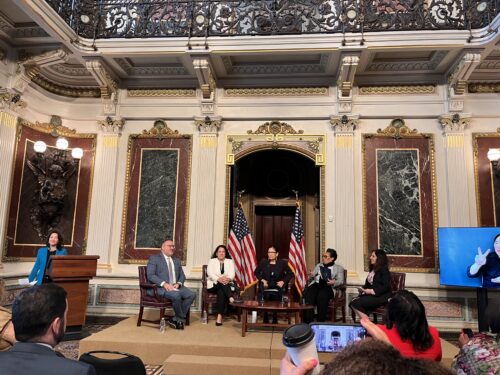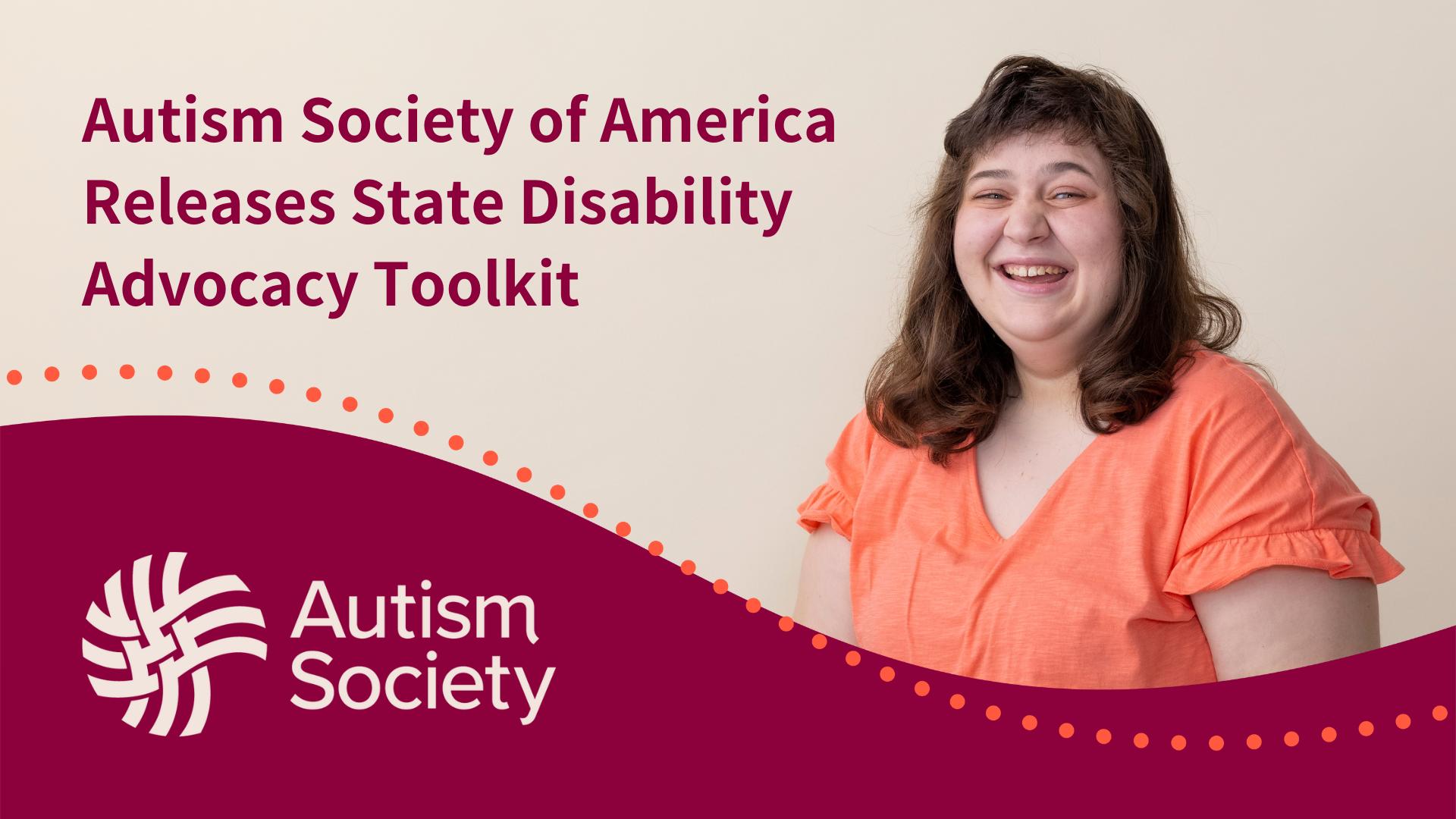
In this issue of Capitol Connection, see updates on government funding, a White House meeting on Equity, the Autism CARES Act, and other bills introduced in Congress. Use the Autism Society’s Action Center to educate your Members of Congress on legislative issues important to you and your family. To easily keep up to date on your opportunities to take action, text AUTISM to 50457 to receive our alerts.
Autism CARES Act and Healthcare Hearing
On February 10th, the House Energy and Commerce Subcommittee on Health held a hearing on 18 bills related to health and disabilities, including the Autism CARES Act (HR 7213) and the Lifespan Respite Care Act (HR 6160) that are supported by the Autism Society of America. Dr. Shih, Senior Science Officer of Autism Speaks testified about the urgent need to reauthorize the Autism CARES Act and increasements investments in Autism research and training programs to ensure better care and wellbeing for Autistic people. Rep. Diana Harshbarger (R-TN) asked about the importance of the ADDM network (one of them is in her district), as well as co-occurring conditions. Dr. Shih answered that the ADDM network is instrumental in terms of shifting our thinking about Autism in the United States. The network allows us to connect data; specifically, long-term and cross-sectional data about our population and our community in the United States. This includes seeing where needs are the greatest, seeing where there are gaps in terms of services, and where we are seeing growth in terms of the Autistic population. HR 7213, as introduced, increases the authorization for appropriations but makes no other changes. We expect additional amendments to be added during the committee markup. No date is scheduled yet. There are no Senate companion bills for either law. The hearing is archived on the committee website. (see also Autism CARES Act issue brief for more information about the law).
Budget and Appropriations
Congress is, once again, facing a possible government shutdown if they do not pass another continuing resolution (CR) before March 1st; and the House is on recess until February 28th. The current CR set new spending deadlines for Congress with funding for some agencies — including the Agriculture Department, Transportation Department, and Energy Department — expiring on March 1st and funding for the remaining agencies expiring on March 8th. If Congress does not complete its work by April 30th, a one percent cut will be applied to all discretionary spending. Given how long it has taken to reach spending agreements over the past several months, there is concern that 72 hours won’t provide enough time to agree on a long-term spending agreement. Continue to educate Members of Congress using our Action Alert about the need to avoid a government shutdown and to provide adequate funding for programs that support people with Autism and other disabilities.
White House Meeting on Equity

From left to right- Secretary of Education, Doctor Miguel Cardona; Administrator of the Small Business Administration Isabel Guzma; Secretary of the Interior, Deb Haaland; Secretary of Housing and Urban Development, Marcia Fudge; and Director of the United States Domestic Policy Council, Neera Tanden
The Autism Society participated in the 2024 White House Convening on Equity. This convening included national civil rights organizations, community organizers, advocates, and policy leaders to discuss and hear from Department officials on actions they have taken to increase equity. Department officials included Miguel Cardona, Secretary of Education, Marcia Fudge, Secretary of Housing & Urban Development, and more. Watch the recording of the event here.
IACC Comments
The Association of University Centers on Disabilities and the Autism Society of America provided joint comments in response to a request for information from the Interagency Autism Coordinating Committee (IACC) on co-occurring conditions related to Autism. The comments emphasize the critical need for understanding and addressing co-occurring conditions highlighting significant challenges posed by physical health conditions, mental health issues, and other disabilities that often accompany Autism. The comments emphasize the need for comprehensive research, improved services, and social considerations, the intense impact of COVID-19 on the Autism community, and the crucial nature of specific training for law enforcement. The comments also call for research into psychotherapeutic techniques, sexual and gender identity, employment-related programs, and the creation of a national task force for improved diagnoses.
Voting Rights and Elections
On February 7th, Senators Bob Casey (D-PA), Chairman of the U.S. Senate Special Committee on Aging, and Amy Klobuchar (D-MN), Chairwoman of the U.S. Senate Rules Committee, introduced a package of legislation for participating in voting and running for office more accessible for people with disabilities. The Accessible Voting Act would support state and local efforts to improve voter accessibility and remove barriers to voting. The Removing Access Barriers to Running for Elected Office for People with Disabilities Act would ensure people with disabilities do not lose their crucial, federal disability benefits when they campaign for elected office. The AID (Accessibility and Inclusion to Diversify) Local Government Leadership Act would provide local governments with limited budgets with funding to support accommodations for local elected officials with disabilities. In the House of Representatives, Rep. Madeleine Dean introduced companion bills to the Removing Access Barriers to Running for Elected Office for People with Disabilities Act and the AID Local Government Leadership Act, and Rep. Mary Gay Scanlon introduced a companion to the Accessible Voting Act. For more information, see the press release.
Protecting Health Care for All Patients Act
On February 7, the House approved HR 485, the Protecting Health Care for All Patients Act. This bill, introduced by Representative Cathy McMorris Rodgers (R-WA), amends Title XI of the Social Security Act to prohibit the use of quality-adjusted life years, or QALYs, in coverage and payment determinations under Federal health care programs. This would specify that agencies should not treat extending the life of an elderly, disabled, or terminally ill person as being worth less than extending the life of a younger, non-disabled, or not terminally ill person. This bill was passed 211-208. It is unclear whether the bill will be taken up in the Senate.
Bipartisan Disability Community Act
On February 7th, Representatives Paul D. Tonko (D-NY) and Brian Fitzpatrick (R-PA) introduced the Disability Community Act. This bill would temporarily increase the Federal Match Assistance Percentage (FMAP) for providers who provide home and community-based services for individuals with intellectual and developmental disabilities. Read the press release from Representative Tonko for more information.
Census Bureau Response
In response to comments developed by the Consortium for Constituents with Disabilities (CCD) and others to the U.S. Census Bureau, the Bureau announced that they will not be making the proposed changes to the American Community Survey. The proposed changes would have threatened to undercount people with disabilities. Disability population numbers are tied to many federal programs individuals rely on, and with this change, these programs could lose critical funding. The Census Bureau said the questions will stay the same until 2025 and they will engage with stakeholders on future assessment needs for the disability questions.
Department of Labor Statement
On February 14th, Dante Allen was confirmed by the U.S. Senate to serve as the Commissioner of the Rehabilitation Services Administration (RSA). Upon his appointment, he issued the following statement. In his statement, he set three priorities through which RSA programs will approach their work. First, they will build partnerships with other federal agencies and stakeholders to promote earlier and deeper engagement to promote the best outcomes for individuals with disabilities. Second, they will elevate community expectations for competitive integrated employment by showcasing success stories. Finally, they will encourage the integration of assistive technology and artificial intelligence tools to support competitive integrated employment.
Letter on Medicaid Renewal
The Autism Society signed a letter from the Consortium for Constituents with Disabilities to CMS and HHS on an Interim Final Rule related to Medicaid renewal. The letter supports the Interim Final Rule but also stresses that CMS should do everything in its power to ensure states are following the current protocol when it comes to renewals and limiting those who are terminated solely for procedural reasons. As of January 16th, 2024, more than 15 million people have been terminated from Medicaid, with approximately 71% terminated for procedural reasons.
State Advocacy
Kansas Law on Subminimum Wages
The Kansas Governor signed a comprehensive employment bill for people with disabilities into law. This new law will establish a Sheltered Workshop Transition Grant Program to incentivize current employees who pay subminimum wages to transition into a competitive integrated employer. It also creates a Disability Employment Act tax credit only for employers who pay minimum wage or more. In addition, it eliminates the minimum work-hour requirement for Kansans with disabilities to qualify for health insurance coverage. This monumental law will help transition current 14(c) holders out of the workshop model and promote more dignity for disabled workers.
Justice Corner
The Baltimore Police Department and the Autism Society Baltimore-Chesapeake announced a partnership to develop better communication between non-speaking Autistics and police. Officers were provided with a pocket-size communication guide to help them identify needs when interacting with people in the community and to help non-speaking Autistic community members share their needs with first responders. As part of the program, the police department will train all current officers about the function of the communication guide and share a video for incoming officers to view. The non-verbal training video is available here: Non-Verbal Training Video.mp4 – Google Drive.
Share:







